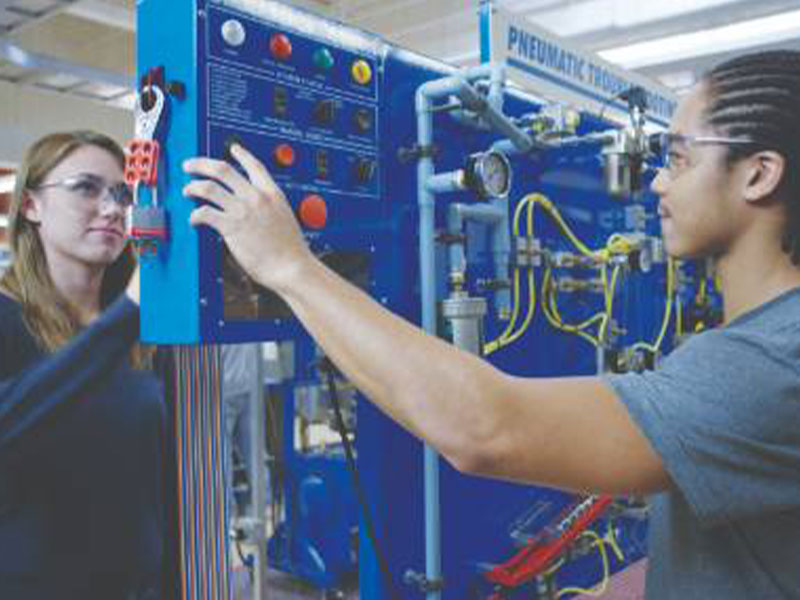CCAC Receives $100,000 Grant From Johnson Controls To Train Next Generation of Skilled Trade Workforce

Mechatronics students working on project
Johnson Controls Community College Partnership Program invests in CCAC's skilled trade programs to support thriving career paths, spur local economic development and narrow the global skilled labor gap
Pittsburgh
The Community College of Allegheny County (CCAC) was awarded a $100,000 grant from the Johnson Controls Community College Partnership Program. The grant will enable CCAC to offer career pathways for the next generation of building technology innovators through expansion of its associate degree and certificate programs in Mechatronics. As one of only 10 community colleges in North America to receive the funds in this year's cohort, CCAC is also eligible for up to three years of renewed funding in addition to the initial investment.
"We are grateful for the opportunity to partner with Johnson Controls. This funding will enable CCAC to continue to roll out innovative initiatives to offer our students the ability to learn with experts in their fields and train on the most technologically advanced equipment available. The generous support of Johnson Controls and other industry leaders enhances our commitment to equip students from our underserved communities with in-demand, employable skills that will provide pathways to lifelong careers," said CCAC President Dr. Quintin Bullock.
Introduced in 2021, the Johnson Controls Community College Partnership Program will fund $15 million over the span of five years to community colleges throughout North America in support of their HVAC, fire, security and digital academic programs. Funding for each community college differs based on its needs; in general, colleges will use the funding to recruit, support, retain and graduate underserved students who otherwise may not have had the opportunity to pursue higher education. CCAC will use the funding for Mechatronics program development, equipment, faculty training, student recruitment and retention.
Mechatronics, CCAC's signature automation systems program, offers students the opportunity to learn the integrated skills of supply chain, process technology, robotics/artificial intelligence and electrical systems. In this program, students acquire skills and knowledge in five major areas: computer programming, electrical systems, mechanical systems, robotics and additive manufacturing (3D printing). Students benefit from a technical core set of courses that combine industry-recognized certification and a quality college education.
As part of the partnership, local Johnson Controls employees will serve as volunteer educators and mentors, providing CCAC students with counseling and real-world experiences. The mentoring will be directly incorporated into the college's Mechatronics program to provide a pathway for student internships and entry-level opportunities at Johnson Controls.
"This is a long-term investment in the workforce of the future. Johnson Controls has made the generous commitment to offer not only financial support, but opportunities for ongoing collaboration with their employees in various capacities," said Jamie McMahon, Chief Executive Officer, CCAC Educational Foundation.
According to the U.S. Bureau of Labor Statistics, nearly eight million skilled labor jobs were lost from the labor force during the pandemic. About half have been filled, but an estimated four million vacancies remain in industries responsible for transportation, construction and mechanical needs nationwide. Additionally, the U.S. Census Bureau estimates that nearly one-fourth of the manufacturing workforce is 55 or older; as they age and retire, there are not enough young people entering the trades to fill their positions. Filling these vacancies to support a healthy industry will take commitment and expertise across generations.
"At Johnson Controls, we strive to provide students with appropriate insights, mentorship and knowledge to empower them to move forward with a successful career in infrastructure. In doing so, we will change the trajectory of lives for these students," said Nate Manning, Vice President and President of Building Solutions in North America. "We will continue steering our efforts and initiatives toward preparing the next generation for a rewarding and sustainable career path that will have a lasting impact on the future of green buildings."
